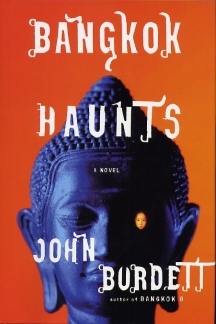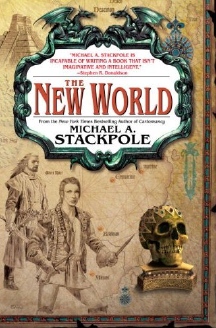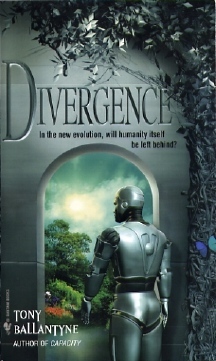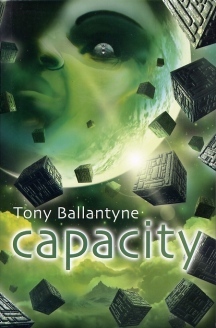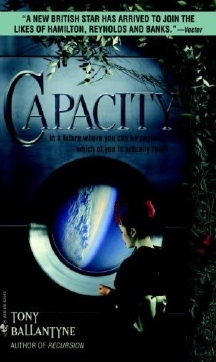Trashotron.com |
||
This Just In...News From The Agony Column
Here's an MP3 preview of the Monday June 18, 2007 podcast for The Agony Column. Enjoy!
06-17-07: Preview for Podcast of Monday, June 18, 2007 : Be Prepared.
06-16-07: NPR URL For Vampire Lit Now Accessible
NPR has just created the URL where you'll be able to get the audio for my report on vampire fiction. You can even use the Email this story link now, and it would be helpful if you did so. Working the system! Thanks!
06-15-07 Update: Vampire Fiction on Weekend All Things Considered
NPR URL Now Accessible: No Audio
Harris, Huston, Marks, Moore
My report on vampire fiction featuring Charlaine Harris, Charlie Huston, John Marks, and Christopher Moore will air tomorrow on Weekend All Things Considered, assuming that actual news does not displace it. Check out the website at NPR.org – the story should go up there at around 2-3 PM PDT, and as ever, please email the heck out of it. And enjoy, it was really fun to put it together – almost as fun as reading, which I shall now permit myself to do. I'll post that URL when I get it, stay tuned!
06-15-07: 'Interfictions' Edited by Theodora Goss & Delia Sherman ; KUSP Digitization Drive
An Anthology of Interstitial Writings
Small Beer Press brings the world a lot of great fiction that just doesn't fit elsewhere. They're just slightly out of alignment with literary reality, which is why they produce so much work that's actually of literary import as well as enjoyable to read. Note that those two qualities are found as often in the same books as one might hope.
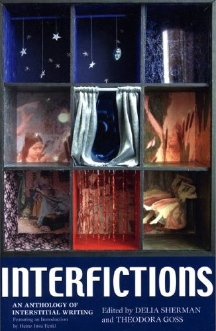
Between the lines.
Playing outside the rules once again is 'Interfictions: An Anthology of Interstitial Writings' (Interstitial Arts Foundation / Small Beer Press ; April 30, 2007 ; $18.00), edited by Delia Sherman and Theodora Goss. In this case, Small Beer Press is the distributor, which means, as I said above, they're bringing the world this collection, while the publisher is the very interesting Interstitial Arts Foundation. The mission is pretty clear: publish stuff that falls between the cracks, that lies outside of any single and perhaps all genres. They call themselves Artists Without Borders, so expect to find literature, visual arts, music and performance arts. Their list of contributors on the website is pretty amazing; Ellen Kushner, Gregory Frost, Heinz Insu Fenkl and Eve Sweetser; all these just writing essays. There's a lot to look at and more importantly read, and they seem to have chosen to publish on line the sort of material one can read online.
The anthology is quite stellar. Heinz Insu Fenkl provides the introduction that lays out the groundwork of what they're doing. It's not just a haphazard kitchen sink approach. Thought and theory are applied with skill and enthusiasm. But in the end, I'm afraid, we care about the fiction. And that's where this book really shines.
Christopher Barzak's "What We Know About the Lost Families of –––– House" is the perfect example of how fiction can be simultaneously quite experimental and as a result, utterly approachable. Posed like a Q&A, it's the story of its unfortunate effect on those who make the mistake of living there. It simply drew me in immediately with a matter-of-fact delivery of facts that don’t bear close examination. Superb, slick prose in the service of subversive agenda. How could one not like it?
Or Rachel Pollack's 'Burning Beard', taking Joseph out of the Bible and into a modern storytelling idiom, along with lots of Egyptian mythology. Here again, the experimental aspect of the literature is the adoption of a rather breezy tone applied to subjects that do not usually get such a treatment. Plus, it's funny, with mordant prose applied to fantastic, well Biblical-sized events.
The list of writers is pretty amazing, so I'm just going to blurt them out in alphabetical order: Karen Jordan Allen, "Alternate Anxieties", Christopher Barzak, "What We Know About the Lost Families of - House", K. Tempest Bradford, "Black Feather", Matthew Cheney, "A Map of the Everywhere", Michael DeLuca, "The Utter Proximity of God", Adrián Ferrero, "When It Rains, You'd Better Get Out of Ulga" (translated from Spanish), Colin Greenland, "Timothy", Csilla Kleinheincz, "A Drop of Raspberry" (translated from Hungarian), Holly Phillips, "Queen of the Butterfly Kingdom", Rachel Pollack, "Burning Beard - The Dreams and Visions of Joseph Ben Jacob, Lord Viceroy of Egypt", Joy Marchand, "Pallas at Noon", Anna Tambour, "The Shoe in SHOES' Window", Veronica Schanoes, "Rats", Léa Silhol, "Emblemata" (translated from French), Jon Singer, "Willow Pattern", Vandana Singh, "Hunger", Mikal Trimm, "Climbing Redemption Mountain", Catherynne Valente, "A Dirge for Prester John", and Leslie What, "Post hoc". Many of these have graced the pages of this column, because I find this sort of fiction really interesting.
The volume concludes with 'The Spaces Between', a Q&A with the editors about matters that will concern a fair number of the readers of this book; stuff about submissions and how the stories were chosen and the rulebook, so to speak for interstitial fiction. (Yes, I know that's something of an oxymoron.)
On a hold-it-in-your-hands note, the book is very nicely printed and bound. It has a quality feel to it. Each story is followed by a brief paragraph from the author. The cover is very nice, but it might not jump out at you in the store, so take the time to go between the cracks. If you like literary fiction, weird fiction, or more simply: to read ; then pick up this anthology. Turn to almost any page. You'll see what I'm talking about. And, if you don’t already know it, why Small Beer Press is a really a big deal.
Please Give
MeKUSP Money
On Friday, June 15, from 10:00 AM PDT until 11:00 AM PDT, I'll be running an edit of my most recent interview with Cory Doctorow for the Digitization Drive for KUSP. They're trying to upgrade to the digital radio format that's been steamrollered over us so we can all buy new hardware. I'm hoping that some of my listeners will be willing to call in and donate for this cause during the show, or do so online during the show.
During the show.
Last time we had one of these here pledge drive thingies, I had the delightful experience of hosting a show during which nobody called, nobody donated and I was paired with the NPR Mephistopheles. He was really nice guy, super pro, but they dropped me on the board and didn't mention which pot was his. It was a complete and utter embarrassment and any of the pledgy stuff, well I just blew that totally. I expect a similar performance on the morrow and am prepared to be humbled, but if a couple of readers called during the show, that might at least make them less likely to shoot me in the office. So, the number to call is 1-800-655-5877. I hope to hear from you. Thanks!
06-14-07: A Review of John Burdett's 'Bangkok Haunts' ; Jesse Ball Listens to 'Samedi the Deafness'
Ghost World
'Bangkok Haunts', John Burdett's third Sonchai Jitpleecheep novel is to my mind his best yet. It has more ghosts and more humor in the service of a powerfully orchestrated plot of revenge. Burdett's prose, his evocation of the Buddhist perspective in the voice of Sonchai Jitpleecheep, is compellingly alien and familiar. Here's my full-length, in-depth, spoiler-free review of 'Bangkok Haunts'. Sure, I miss the Chip Kidd book cover of the sort that made 'Bangkok 8' so delightful. Kidd did do the dust jacket, though, and it's very nice. Pertinent, too.
For readers of horror fiction, this Burdett novel will offer the best evidence that it is still possible to write utterly innovative horror fiction that is in all respects very different from everything else out there. His sense of supernatural is super-convincing. It's the matter-of-fact presentation of a spiritual world-view that makes 'Bangkok Haunts' such an unusual novel. It's rife with all sorts of otherworldly events and beings, yet it does not feel at all like any other "horror" novel I've ever read.
Mystery readers will find an equally fresh approach to the genre. Burdett upends just about every trope you expect to find in a police procedural, just as matter of course. None of this seems forced or arch. The world that Sonchai inhabits is already so over-the-top that it is beyond satire.
But it's not beyond genuine warmth. The characters seem vivid and real. If you;ve not read the first two books in the series, you should; the first is 'Bangkok 8' and the second is 'Bangkok Tattoo'. Burdett should be on your auto-buy list, and he's currently on tour from Bangkok. Here are his tour dates. He's worth listening to – and of course reading.
Remembering Lies Perfectly
Is it really desirable to remember it all? We now know that we can suppress our memories by ingesting chemical compounds shortly after a traumatic experience, and the morality of such a decision is not obvious or apparent. Our memories are elided without our planning or permission. This becomes particularly pertinent with regards to those who witness a crime. Eyewitness testimony is the most believable and the most inaccurate. Often we do not know that we are witnessing a crime until after the fact. Our "you must remember this" switches aren't on. We have to work our way backwards into the past.
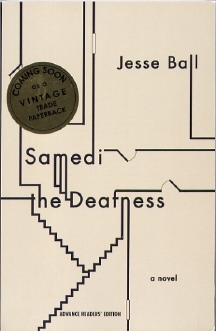
Oh, if only it were all so simple.
This is not the problem faced by James Sim, the mnemonist at the center of 'Samedi the Deafness' (Vintage Original Publication ; September 4, 2007 ; $12.95) by Jesse Ball. One fine Sunday morning, James Sim goes out to buy a newspaper, which he takes to read in the park. Absorbed in his own thoughts, he looks up when he hears a shout. A man crumples in the field in the distance. James approaches him, sees that the man has been stabbed, many times, and asks his name. Thomas McHale, the man replies. He then follows on with series of mysterious but clearly meaningful confessions. Names, places. A particular name, Samedi. It's so much information that the reader might think James would have a hard time remembering it.
But he's a mnemomist.
He has a photographic memory and recall is the least of his worries.
Soon he'll read of yet another suicide on the lawn of the White House. The carries a note signed SAMEDI. Soon, James will find himself pursued, kidnapped. Locked in a mansion with compulsive liars. He'll meet a woman named Grieve. And then things will get strange.
Any genre reader will perk up their ears at the name Samedi. We all know the good Baron, who has made appearances in science fiction novels by Richard Morgan ('Broken Angels') and William Gibson and supernaturally tinged novels by Neil Gaiman ('American Gods') and Tim Powers. We know from the get-go, then, that reality is going to be undermined in Jesse Ball's novel. But dive and you'll quickly become aware of just how much one can undermine reality in a simple novel.
'Samedi the Deafness' is a very strange novel. Written in a dash-style blackout series of scenes, set in a seven-day span, it's subversively easy-to-read. That makes assimilating it all the more ... unusual. Readers who enjoy writers like Chuck Palahniuk and Jonathan Lethem are directed to this novel. Readers who are too comfortable in this reality are too, and those who have never felt comfortable. This is not a novel to comfort you.
Jesse Ball is not the comforting sort either. Take a look at his peculiar in the best way website. He's a poet and a provocateur. I regret to inform you that his website may deliberately frustrate you, though the design is simply outstanding. It may shock you. I read a bit from one of his other book there that was quite disturbing. Girls in a box as a present for your gal. Ankles.
I think a lot of people will either be talking or complaining about 'Samedi the Deafness' when it arrives late in August. I think that Vintage Books is doing a smart thing with a trade paperback original debut novel. It's not his first book–you look at that website, you'll see plenty of books. You can even order the Girls in a box book.
It's the perfect gift for someone you want to remember you.
06-13-07: Michael A. Stackpole Explores 'The New World' ; A Review of Tony Ballantyne's 'Divergence'
Summertime, and the Reading is Easy
Michael Stackpole concludes The Age of Discovery trilogy with 'The New World' (Spectra / Bantam / Random House ; June 26, 2007 ; $15.00) – and you know that summer has arrived.
We hear a lot about summer reading, and how it has to be frothy fun. Well, sure it does, and Stackpole provides the fantasy version, but he offers readers just enough more to make his work worth seeking out. Sure, those things might be on the surface of the novel, but hey, I read the surface of novels as well as plumb the depths. And I happen to enjoy the surface of novels, and I happen to especially enjoy the surface of novels that have some aspects of fantasy and throw in some science fictiony type stuff. Stackpole does this and he does it exceptionally well.
Having setup the world of Nine Principalities in 'A Secret Atlas' and fleshed it out in 'Cartomancy', he whips up a storm in 'The New World'. And it is a New World, with a lot of original fillips that one will not usually find in your standard GCFT. (Generic Celtic Fantasy Trilogy.) Stackpole spins his story not from pastoral medieval Britain, but from the vital and grasping Age of Exploration. What this change immediately does is to give him a wider canvas with more opportunities for interesting action, characters and here's what I like – technology. Though Stackpole is clearly writing the sort of easily-read fantasy that is captivating enough to make you forget the beach you’re sitting on, he litters the work with technology significantly more advanced than rocks, spears and swords. It gives the series a more complicated feel, a deeper texture.
Stackpole follows this up with interesting characters who are intelligently written and tend not to go into dark caves alone. And better still, a fair number of monsters and weird critters. Some people are coo-coo for Cocoa Puffs, others are suckers for serpent people, and I happen to be among the latter. (I prefer Cocoa Crispies to Puffs, thankyouverymuch.) Stackpole also glosses his fantasy with lots of Oriental flourishes that give 'The New World' a much more exotic feel. If the books lend themselves to being read near the water – like on a beach – then this is not too surprising.
Given the import of books like Naomi Novik's 'His Majesty's Dragon' (the Temeraire series) and Austin Grossman's 'Soon I Will Be Invincible', it's probably not a bad time to mention that Stackpole shares a background in computer game design with these writers, which he writes about on his website. Not so long ago, I would have counted that against an author. But if I ever did so in print before, I'll not do so now. The world of computer games is proving a fertile ground for developing writers. Indeed, it may be The New World.
The Saints are ever with us, though not in the form that the ancient religious institutions would have us believe. But they’re not writing a lot of parables these days. No that's down to writers like Tony Ballantyne, who in 'Divergence' sets a drawing room afloat in space with passengers there to converse about the meaning of life while deftly avoiding death.
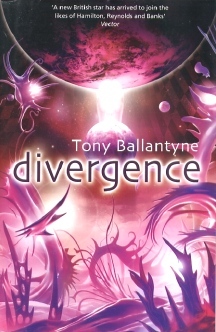
Above, UK, below US.
Ballantyne's trilogy is very peculiar science ficion. Since you've got spaceships and encounters in space, the space opera description is certainly obvious, but this book most reminds me of Philip K. Dick's 'The Three Stigma or Palmer Eldridch'. Both books use a space journey to provide a means of discussing problems that were until recently the sole provenance of religious thinkers. Ballantyne also goes for a spectacular climax that is joyously hallucinatory, a special-prose effect extravaganza that creates some lovely visuals and justifies the glorious covers of Dominic Harman on the UK editions.
Stateside, you can now pick up all three book for just a hair over twenty bucks and plow through them without pause. I prefer the UK trade paperbacks, but then, I'm fussy that way. It's always preferable to refrain from beginning a series until the final book comes out, just to be sure that the series is going to get finished in this lifetime. 'Divergence' is reviewed here. I'd love to think of Saint Augustine brought to life in our century, and were that to be the case, I think the most interesting literature to him would not be the administrivia of the Church. No, Augustine was a man who wanted to think about our soul, about our inner freedom and bondage. If wanted to read about those concepts, wrapped up and delivered in a science fiction series, Tony Ballantyne's 'Recursion' / 'Capacity' / 'Divergence' trilogy would be pretty damn good place to start.
06-12-07: Jeff Prucher Discovers 'Brave New Words' ; A Review of 'Capacity' by Tony Ballantyne
The Oxford Science Fiction Dictionary
Books about the science fiction genre can speak to much more than an ill-defined genre of literature. When we examine our most free-form, imaginative literary creations, we're looking at ourselves in a funhouse mirror. Our hopes and fears and dreams and insecurities dance before our eyes, brought to life in the words we have written – and created. Science fiction is perhaps one of the most fertile grounds for neologisms, those made-up words, that within the genre are used to describe technologies, societies, events and philosophies that do not as yet exist. 'Brave New Words: The Oxford Dictionary of Science Fiction' by Jeff Prucher is an annotated lexicon of science fiction's neologisms. It's 278 pages of made-up words, defined. It is the bits and shreds of our shattered psyches, catalogued, analyzed, brought to light.
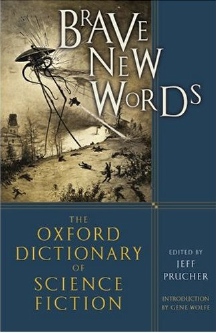
That has such beings in it.
Prucher is straightforward and thorough. He tells us from the get-go that, "My use of "science fiction" here excludes, for the most part, the genre of fantasy, while recognizing that the boundary between the two is indistinct at best; words that are used in both genres are represented, as are those in such hybrid genres as science fantasy." The book includes not just words coined in science fiction, but also those words coined to describe science fiction. So you get worldbuilding as sell as worldlet– neither of which is recognized by my built-in M$ Word dictionary.
The entries are generously laid out in type large enough to be easily read. You get:
Word {n,v,adj, etc} {Pronunciation, where applicable} Definition(s), Citations.
It's a simple formula and a fascinating book. You also get some breakout pages that collect words associated with major science fiction topics, such as Space Drives and Time Travel. These pages discuss the über-sbject and offer pointers to a variety of definitions associated with that subject. The cites are listed from earliest to latest, and Prucher offers readers an opportunity to submit updates and other cites via his website.
If you are among the readers who think that this sounds like the keenest thing since the jetpack, then run, don’t walk to your nearest local independent bookstore and buy it. You are indeed correct, you do need this book. If you think you might need this book for academic purposes, then once again, you’re correct -- go buy it. If you want something that will stimulate conversation instead of long strings of drool on the coffee table, then again, this is the book you seek.
The introduction by Gene Wolfe is as literate as you might expect, that is, very, but admirably brief. The setup pages and explanation pages are as nicely laid out as the main body of the book. No part of this book will hurt your eyes, and that is not often the case with a book that claims to be a dictionary.
'Brave New Words' is an essential book for almost any reader, any writer, in fact anybody. We understand our world with language, and as you page through this book, you'll realize that the power of science fiction stems not just from the collections of words that form novels, short stories and criticism. The individual words created by science fiction writers are the secret poetry that animates the genre and helps create our world. Many words that we take for granted as having been part of the language, well, forever, are indeed the work of a single author toiling away to create a novel. Like it or not, science fiction writers are building your future, one word at a time. This book catalogues those words, our world, our past and paints the future.
Saints and Patience
I'm presenting a review of Tony Ballantyne's 'Capacity', his follow-up to 'Recursion'. I like Ballantyne's work a lot, and 'Capacity' is part of an ambitious trilogy. It can't hurt to say this too many times, so I find myself forced to mention that you can read 'Recursion' by itself, 'Capacity' is a sequel that to my mind requires you read both 'Recursion' and 'Divergence'. You need to read 'Recursion' to know the world and because specific portions of the novel are referred to in 'Divergence'. You need to read 'Divergence' because 'Capacity' sets up portions of a story it does not finish. The UK Trade paperback original, the true first edition, puts it this way: "The end of Capacity. Judy's story will be completed in 'Divergence'" . The US Mass Market paperback just includes a teaser from the 'Divergence'.
OK UK. Art by Dominic Harman.
I find it pretty interesting that they compare Ballantyne's books to those of Alastair Reynolds and Ian Banks, but to my mind the better comparison is William Gibson or Philip K. Dick. The 'Recursion ' / 'Capacity' / 'Divergence' books do get off earth and ramble about the cosmos, but they do so using for the most part floating drawing rooms. There the characters try to sort out who is who and what is what. Expect a lot of conversation that deals with Saint Augustine-like concepts of sin and free will. You may however, need your saint-like patience when it comes to putting together the plot.
Ballantyne's plotting style may confuse some readers, as he intermingles past and present for characters in a manner leaves you breathless. But for this reader, that's part of the appeal. Ballantyne writes what I call science fiction mysteries, but not in a future gumshoe manner. Instead, he presents you with separate mysterious worlds and plots and character and lets you figure out how they intermingle. One portion will often prove to be back story for another, just as this introduction provides, I hope a backdrop for the actual review. Here it is.
06-11-07: A 2007 Interview of Helen Simpson by Kathryn Petruccelli
"Farce, it's just tragedy speeded up"
"I read a short story before I get out of bed each morning," Helen Simpson says. "It's a way to steal a march on the day." Not surprisingly, Simpson's works are perfect for this plan, which strikes me as a very good idea. 'In the Driver's Seat' (Knopf / Random House ; May 8, 2007 ; $22) collects eleven stories in 177 pages, each a self-contained world, a bubble in time. She deals in close-ups of men and women who in a moment, in a gesture, in a single savage phrase, reveal their lives, their hopes gone sour. Often this turns out to be,as it were, rather funny.
Simpson's language is simple and direct, but her ability to immerse the reader in the immediacy of a situation without really any exposition is simply amazing. But still, immediacy, smart writing, insight, all good – funny is better. And the dark sense of humor that Simpson brings to her work is utterly refreshing. She revels in the unpleasant truth, a truth that hurts so much the only workable response is a sort of uncomfortable laughter. But it's laughter all the same. "If I'm Spared" is a fantastic example of this. Tom is a foreign correspondent who has a bit of a hard time re-adjusting when he returns to his safe home. "So when Barbara in a crass moment asked him to do something like take out the rubbish, as she had tonight, it jarred. 'Sorry, I was miles away,' he'd said. 'Can't get that child out of my mind, the one I was telling you about who lost both her legs in the bombing. What did you say?'" Trouble is, the girl he can't keep out of his mind is Fiona, "proud of what in Pilates-speak was described as her inner corset."
Kathryn Petruccelli of KUSP interviewed Helen Simpson, and you can hear the (MP3 or RealAudio) reading that Simpson does, some partway through the conversation, from "If I'm Spared". It's probably the funniest reading you'll ever hear wherein a patient receives a bad cancer diagnosis. It's hysterical and Simpson's reading is a delight. Trust me, when you hear her talk with Kathryn and read from her work, you'll definitely be heading down to the bookstore to pick up the collection. The great thing is that having heard Simpson speak and read, you'll have that sort of delightful experience of hearing the stories in her voice when you do.
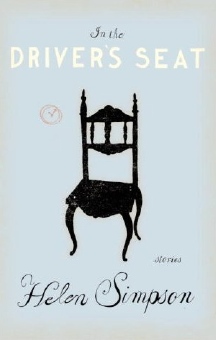
Issues of control and confinement.
"Up at a Villa" is the kind of miniature vision that demonstrates Simpson's skills. It's a very short, one-scene story in which some teenagers using a hotel pool they're not supposed to be using are forced to hide when a new mum and dad show up. They become privy to a conversation that reveals much both about P&M but also about the kids. Pasts and futures collide and stumble into one another. It's a wonderfully crafted tale that could only work as short story, a story that demonstrates the power of the medium.
And once again, this is why we have to make an effort to break out of whatever our reading and other habits may be. We have to force ourselves to pick up books that are out of our comfort range, because you'll more often than not find that those books help extend our comfort range, or in the case of Simpson, our discomfort range. Simpson's work is engaging, charming and deadly. You might want to laugh, especially if you consider the alternatives.
